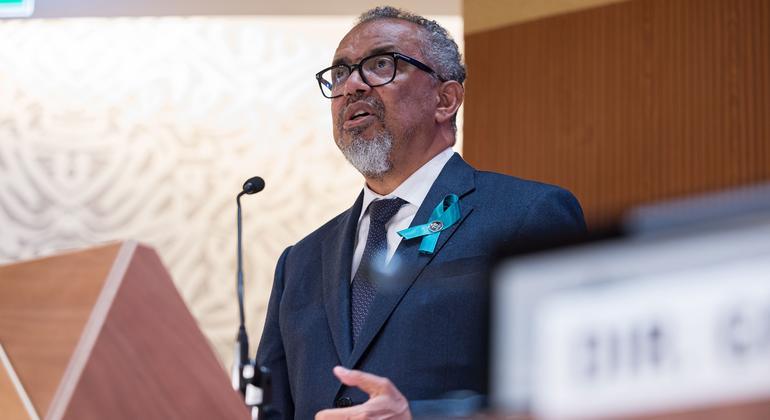Tedros Adhanom Ghebreyesus, general director of the World Health Organization, urged Member States to stay focused on shared objectives even in the midst of global instability.
“We are here not to serve our own interests, but the eight billion people in our world“He said in his opening speech at the Palais des Nations.” Leave an inheritance for those who come after us; for our children and our grandchildren; and work together for a healthier, more peaceful and more equitable world. It is possible. “
The Assembly, whose highest decision -making organizes on May 27 and brings together delegations from 194 Member States under the topic One World for Health.
This year’s agenda includes a vote on the intensely negotiated pandemic agreement, a reduced budget proposal and climate discussions, conflict, antimicrobial resistance and digital health.
Pandemic prevention approach
A central element in the assembly agenda is the proposed Pandemic Pandemic agreement, a global compact destined to prevent the type of fragmented response that marked the early stages of COVID-19.
The treaty is the three -year result of negotiations between all the WHO Member States.
“This is really a historical moment,” said Dr. Tedros. “Even in the middle of the crisis, and in the face of an important opposition, you worked tirelessly, you never surrendered and you reached your goal. “
A final vote on the agreement is expected on Tuesday.
If adopted, it would only mark the second time that countries have joined to approve a legally binding global health treaty under the WHO founding rules. The first was the Tobacco Control Framework Convention, adopted in 2003 to stop the global tobacco epidemic.
2024 Health Check
In his direction, Tedros presented the highlight of the 2024 results report, pointing out both progress and persistent global health gaps.
On tobacco control, he cited a Global reduction of one third in the prevalence of smoking since the WHO frame convention entered into force two decades ago.
He praised countries, including ivory coast, Oman and Vietnam for introducing stronger regulations last year, including simple containers and restrictions on electronic cigarettes.
In Nutrition, he pointed out new WHO guidelines on the waste and expansion of the Farmless Farm Initiative in Africa, which has supported thousands of farmers in the transition to food crops.
He also emphasized who is the growing work in air pollution and climate resistant health systems, including associations with Gavi and UNICEF to install solar energy in health facilities in multiple countries.
In maternal and child health, Tedros said it stagnated progress and described the new national acceleration plans to reduce the mortality of newborns. Immunization coverage now reaches 83 percent of children worldwide, compared to less than 5 percent when the extended immunization program was launched in 1974.
“We are living in a golden age of the elimination of the disease.“He said, citing the certification of Cabo Verde, Egypt and Georgia as free of malaria; progress in negligible tropical diseases; and the recognition of Botswana as the first country to reach the status of gold level to eliminate the transmission of HIV from mother to son.
Who has been supporting universal health coverage in Rwanda.
WHHO BUDGESS STRAIN
As for the internal operations of the WHO, Tedros offered a clear evaluation of the organization’s finances.
“We face a salary gap for the next biennium of more than US $ 500 million “, said. “A reduced workforce means a reduced working range.”
This week, Member States will vote on a proposed increase of 20 percent in the contributions evaluated, as well as a reduced program budget of $ 4.2 billion by 2026-2027, below an earlier proposal of $ 5.3 billion. The cuts reflect an effort to align who works with current financing levels while preserving central functions.
Tedros acknowledged that the dependence of the old dependence on the volunteer assigned funds of a small group of donors had left it vulnerable. He urged Member States to see the budget deficit not only as a crisis but also as a possible turning point.
“Or we must reduce our ambitions on what it is and does, or we must raise money,” he said. “I know which one I will choose.”
He obtained a strong contrast between the WHO budget and the priorities of global spending: “US $ 2.1 billion is the equivalent of global military spending every eight hours; US $ 2.1 billion is the price of a stealth bomber: to kill people; US $ 2.1 billion is a quarter of what the tobacco industry spends in advertising and promotion every year.
“It seems that someone changed prices of what is really valuable in our world.“, Said.
Emergencies and appeals
The general director also detailed the OSS emergency operations in 2024, which covered 89 countries. These included responses to sprouts of anger, Ebola, Mpox and Polio, as well as humanitarian interventions in conflict areas such as Sudan, Ukraine and Gaza.
In Gaza, he said, that he had supported more than 7,300 medical evacuations since the late 2023, but more than 10,000 patients remained in the need for urgent care.
Looking to the future: who transformed who?
The WHO chief closed with a look at the future direction of the agency, made up of the lessons of the COVID-19 pandemic. He highlighted new initiatives in Pandemic Intelligence, Vaccine Development and Digital Health, including expanded work on artificial intelligence and support for the transfer of ARNM technology to 15 countries.
Who has also restructured its headquarters, reducing the layers of management and rationalization of the departments.
“Our current crisis is an opportunity“Dr. Tedros concluded.” Together, we will. “




